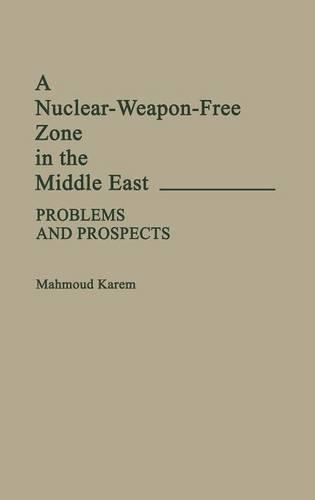
A Nuclear-Weapon-Free Zone in the Middle East: Problems and Prospects
(Hardback)
Publishing Details
A Nuclear-Weapon-Free Zone in the Middle East: Problems and Prospects
By (Author) Mahmoud Karem
Bloomsbury Publishing PLC
Praeger Publishers Inc
25th March 1988
United States
Classifications
Tertiary Education
Non Fiction
International institutions / intergovernmental organizations
327.1740956
Physical Properties
Hardback
202
Description
It is clear that the proliferation of nuclear weapons among Middle East nations would pose grave problems for that politically explosive region as well as for the rest of the world. This study examines the possibilities of avoiding such a situation and of reducing tensions generally by implementing United Nations resolutions calling for the establishment of a nuclear-weapon-free zone (NWFZ) in the Middle East. Arguing that the NWFZ approach is a viable solution, it suggests how it could be implemented and how diplomatic obstacles facing such an agreement could be overcome. Following an introduction, the author analyzes previous international NWFZ initiatives, including both those that culminated in treaties and those that have not. Reasons for success or failure, including the impact of superpower politics, are considered. He then looks at the dangers posed in the Middle East as a result of the threat of nuclear weapons proliferation, with particular reference to the status of Israel. In the final chapter he extracts useful lessons from earlier NWFZ initiatives and offers recommendations for creating support for the proposed zone as well as for resolving issues that have proved troublesome in the past.
Reviews
As a former fellow of the Byrnes International Center at the University of South Carolina and Egypt's representative to the UN disarmament Committee since 1977, Karem is eminently qualified to write on the role of Nuclear Weapons-Free Zones (NWFZs) in the processes of averting nuclear weapons proliferation, arresting the nuclear arms race, and eliminating the courage of nuclear weapons. Karem's well-written, extensively documented, and cogent argument for a NWFZ in the Middle East reflects his scholarly and professional expertise on the technical and political issues surrounding such a proposal. In addition two full chapters are devoted to other inititatives to establish NWFZs (e.g., the 1967 Tlatelolco Treaty on Latin America), their relative successes and failures, and their applicability to creating a NWFZ in the Middle East. Karem also explores in detail the unique aspects of the Middle East with emphasis on Israel's nuclear weapons policy. The highly specific revelations of Israel's existing nuclear arsenal published in The Sunday Times (London) have more than substantiated Karem's careful speculations. A final chapter offers concrete policy prescriptions, recommendations, and options on how to implement a NWFZ in the Middle East. This is an important and much needed contribution to the literature on peace studies, arms limitation, disarmament, and world order studies.-Choice
"As a former fellow of the Byrnes International Center at the University of South Carolina and Egypt's representative to the UN disarmament Committee since 1977, Karem is eminently qualified to write on the role of Nuclear Weapons-Free Zones (NWFZs) in the processes of averting nuclear weapons proliferation, arresting the nuclear arms race, and eliminating the courage of nuclear weapons. Karem's well-written, extensively documented, and cogent argument for a NWFZ in the Middle East reflects his scholarly and professional expertise on the technical and political issues surrounding such a proposal. In addition two full chapters are devoted to other inititatives to establish NWFZs (e.g., the 1967 Tlatelolco Treaty on Latin America), their relative successes and failures, and their applicability to creating a NWFZ in the Middle East. Karem also explores in detail the unique aspects of the Middle East with emphasis on Israel's nuclear weapons policy. The highly specific revelations of Israel's existing nuclear arsenal published in The Sunday Times (London) have more than substantiated Karem's careful speculations. A final chapter offers concrete policy prescriptions, recommendations, and options on how to implement a NWFZ in the Middle East. This is an important and much needed contribution to the literature on peace studies, arms limitation, disarmament, and world order studies."-Choice
Author Bio
MAHMOUD KAREM is Ambassador of Egypt to Japan and a member of the Cabinet of the Deputy Prime Minister and Minister of Foreign Affairs.
